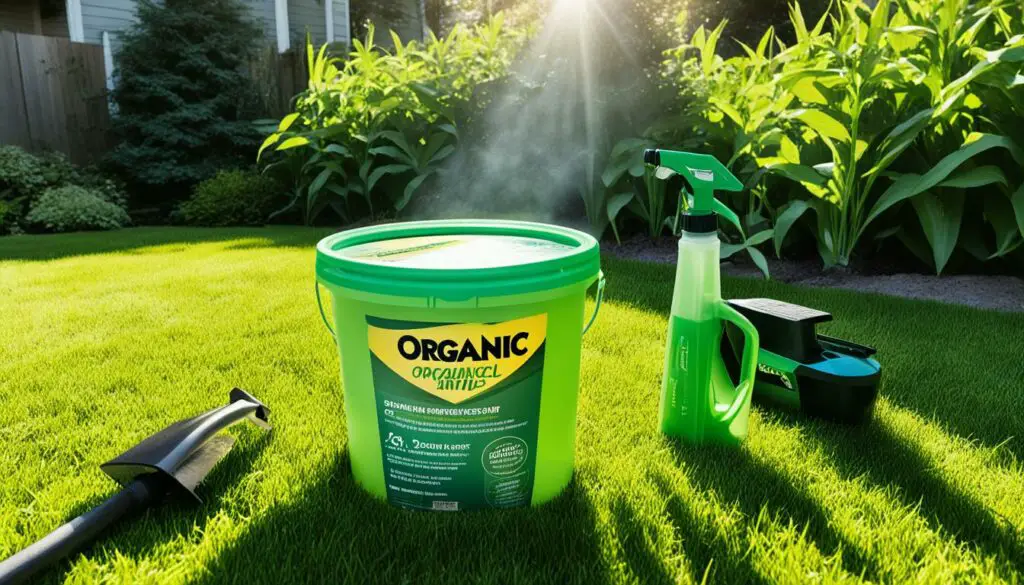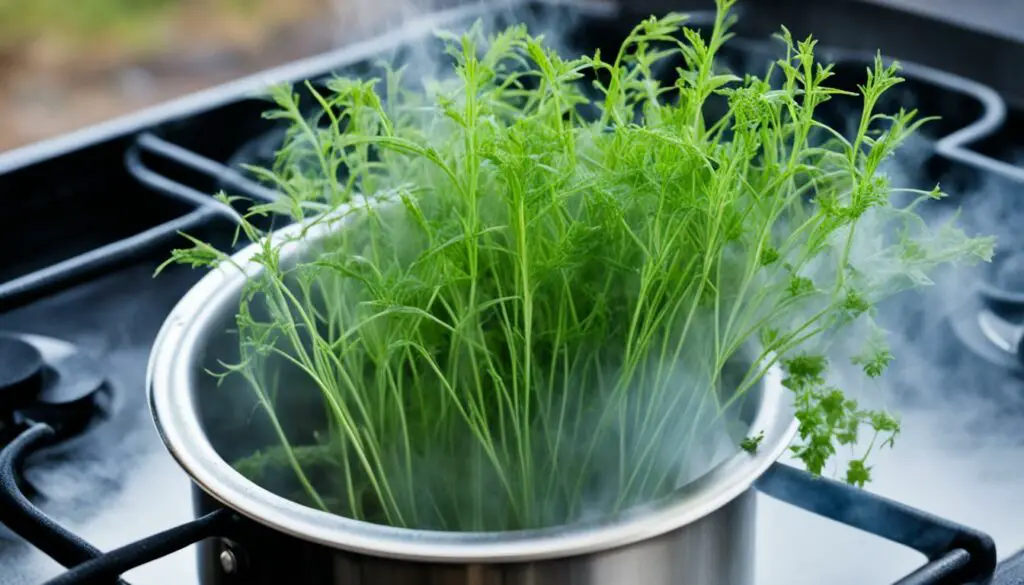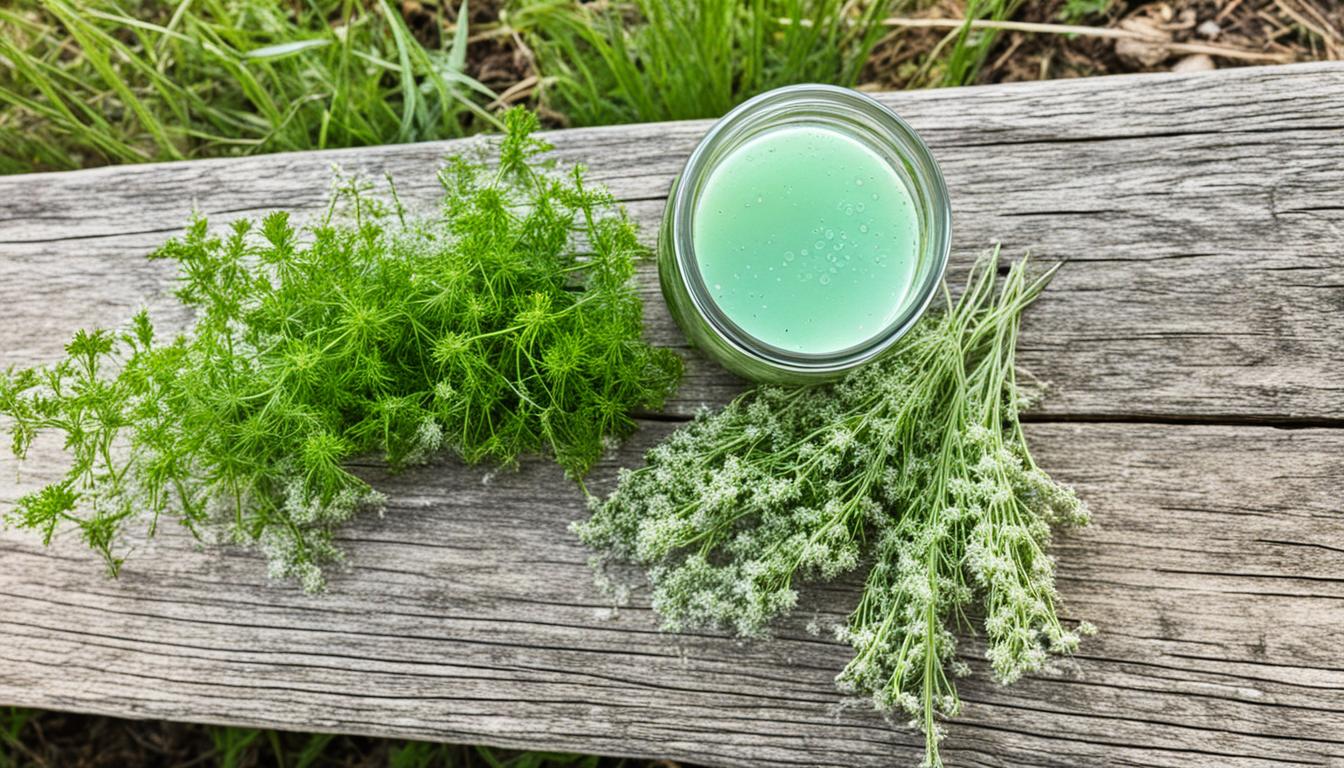Keeping weeds under control is an ongoing challenge for gardeners. While there are many commercial weed killer products available, they often contain harmful chemicals that can be detrimental to the environment and the health of your plants.
But did you know that you can make your own weed killer using common household ingredients? Not only is it a cost-effective solution, but it also allows you to maintain an organic garden while effectively managing weeds.
In this article, we will provide you with a simple and eco-friendly DIY weed killer recipe that you can easily make at home. By using natural ingredients, you can effectively control weeds without harming the environment or compromising the health of your garden.
Contents
- 1 The Benefits of Using Homemade Weed Killer
- 2 Recipe for Homemade Weed Killer
- 3 Using Homemade Weed Killer
- 4 Safety Precautions When Using Homemade Weed Killer
- 5 Alternative Homemade Weed Killer: Horticultural Vinegar
- 6 Alternative Homemade Weed Killer: Corn Gluten Meal
- 7 Alternative Homemade Weed Killer: Boiling Water
- 8 Integrated Weed Management Strategy
- 9 Tips for Using Homemade Weed Killers
- 10 Conclusion
- 11 FAQ
- 11.1 Can I make my own weed killer at home?
- 11.2 What are the benefits of using homemade weed killer?
- 11.3 How do I make homemade weed killer?
- 11.4 When is the best time to apply homemade weed killer?
- 11.5 Are homemade weed killers safe for pets?
- 11.6 Should I rinse off the homemade weed killer?
- 11.7 What is horticultural vinegar?
- 11.8 How does corn gluten meal work as a weed killer?
- 11.9 How does boiling water work as a weed killer?
- 11.10 What is an integrated weed management strategy?
- 11.11 What are some tips for using homemade weed killers?
- 11.12 Are homemade weed killers safe for the environment?
- 12 Source Links
Key Takeaways:
- Over 75% of American gardeners use some form of weed killer.
- Making your own weed killer allows you to maintain an organic garden.
- Homemade weed killers are cost-effective and environmentally friendly.
- Using natural ingredients can effectively control weeds without harming your plants.
- In the next sections, we will explore the benefits of using homemade weed killers and provide you with a simple recipe to make your own.
The Benefits of Using Homemade Weed Killer
Homemade weed killers offer numerous advantages over commercial herbicides. They provide a DIY herbicide solution that is both effective and eco-friendly. Unlike synthetic alternatives, homemade weed killers are non-toxic and pose no harm to the environment or the health of your garden. Let’s explore the benefits in more detail:
- Eco-Friendly:
- Safe for Pollinators:
- Easy to Make and Use:
- Budget-Friendly:
Using a homemade weed killer allows you to eliminate unwanted weeds while minimizing harm to the environment. Commercial herbicides often contain harmful chemicals that can leach into the soil and water sources. Homemade weed killers, on the other hand, are made from natural ingredients such as vinegar, salt, and dish soap, making them eco-friendly weed killer options.
Homemade weed killers are eco-friendly and do not harm beneficial insects like bees. Unlike synthetic alternatives, which can be toxic to pollinators, homemade weed killers offer a safe and non-toxic weed killer option that allows you to protect both your garden and the bees.
Creating your own weed killer is a simple and straightforward process. Most recipes use common household ingredients that are readily available, such as vinegar, salt, and dish soap. These ingredients are easy to mix and apply, making homemade weed killers a convenient choice for DIY herbicide enthusiasts.
One of the biggest advantages of using homemade weed killers is that they are cost-effective. Commercial herbicides can be expensive, especially for larger gardens or multiple applications. Making your own weed killer allows you to save money while still maintaining an effective weed control method.
“Homemade weed killers offer a safe and affordable alternative to commercial herbicides, making them a popular choice among eco-conscious gardeners.” – Garden Guru Magazine
By utilizing homemade weed killers, you can effectively control weeds without compromising the health of your garden or the ecosystem. Their eco-friendly weed killer properties and budget-friendly nature make them a sustainable choice for maintaining a vibrant and thriving garden.
| Advantages of Homemade Weed Killers | Commercial Herbicides |
|---|---|
| Eco-friendly and non-toxic | May contain harmful chemicals |
| Safe for pollinators | Can harm beneficial insects |
| Easy to make and use | Can require complex mixing or safety precautions |
| Budget-friendly | Expensive, especially for larger gardens |
Recipe for Homemade Weed Killer

If you’re looking for an effective way to control weeds in your garden without relying on chemical herbicides, creating your own homemade weed killer is the perfect solution. This eco-friendly alternative not only helps you maintain organic weed control but also saves you money. With just a few simple ingredients, you can make a powerful homemade herbicide that is safe for your plants and the environment.
The Ingredients You’ll Need:
- 1 liter of white vinegar
- 3 large tablespoons of salt
- 3 teaspoons of dish soap
- A spray bottle
To make your homemade weed killer, follow these easy steps:
- Start by mixing the white vinegar and salt in a container. Stir until the salt is completely dissolved.
- Add the dish soap to the vinegar and salt mixture. Stir well to combine all the ingredients.
- Transfer the solution into a spray bottle for easy application.
And that’s it! Your homemade weed killer is now ready to use.
Using Homemade Weed Killer
To effectively control weeds in your garden, it is important to know the best practices for applying homemade weed killer. By following these guidelines, you can ensure maximum effectiveness and minimize potential harm to your plants and the environment.
Best Time to Apply Weed Killer
The best time to apply homemade weed killer is on a dry, sunny day. The sunlight helps activate the ingredients in the solution and accelerates the weed-killing process. It is recommended to apply the solution at midday or just before when the sun is at its peak.
Shake and Spray
Before applying the homemade weed killer, give the weed a gentle shake to remove any insects or debris. For small weeds, you can spray the solution directly onto the leaves. Make sure to cover the leaves thoroughly to ensure effective weed control.
Saturate Larger Weeds
If you’re dealing with larger, more established weeds, spraying the leaves may not be enough. In these cases, it is recommended to spray the leaves and pour the solution directly onto the plants to ensure proper saturation. This method helps the weed killer reach the roots of the larger weeds and ensures better control.
Wilting within an Hour
After applying the homemade weed killer, you can expect to see results within an hour. The weeds should start wilting and showing signs of damage. Keep an eye on the treated area, and if necessary, reapply the solution to ensure complete weed control.
Comparing the Effectiveness of Applying Homemade Weed Killer
| Weed Type | Small Weeds | Larger Weeds |
|---|---|---|
| Method | Spray the solution directly onto the leaves. | Spray the leaves and pour the solution onto the plants. |
| Expected Result | Wilting within an hour | Wilting within an hour |
| Additional Notes | Ensure thorough coverage of the leaves. | Ensure proper saturation of the weed. |
By following these application techniques, you can effectively utilize homemade weed killer to control unwanted weeds in your garden. Remember to prioritize the health of your plants and the environment when managing weed growth.
Safety Precautions When Using Homemade Weed Killer

While using homemade weed killers is a safe and eco-friendly method for weed control, it is important to take certain safety precautions, especially when it comes to protecting your pets.
Pets Safety: Keep your pets off the treated area until the solution is completely dry. This will prevent any harm to their paws or potential ingestion of the homemade weed killer.
If your pets are prone to eating plants, it is advisable to rinse off the treated area with water before allowing them back in. This extra step ensures their safety and minimizes any potential risk.
Rinsing off the Solution: Additionally, it is essential to rinse off the weed killer solution before nightfall. This helps prevent any harm to wildlife that may walk over the treated area, as well as reduces any residual effects of the solution.
By following these safety precautions, you can effectively use homemade weed killers without compromising the well-being of your beloved pets or the surrounding wildlife.
Alternative Homemade Weed Killer: Horticultural Vinegar
When it comes to organic weed control, horticultural vinegar is an effective alternative to household vinegar. Unlike household vinegar, horticultural vinegar has a higher acidity level, making it more potent in killing weeds.
To use horticultural vinegar as a weed killer, you can follow a similar method to the homemade weed killer recipe. However, it’s essential to take safety precautions as horticultural vinegar can cause skin and eye damage.
Here’s a simple guide to using horticultural vinegar:
1. Choose the Right Concentration: Horticultural vinegar is available in various concentrations, typically ranging from 20% to 30%. Select the appropriate concentration based on the severity of your weed problem.
2. Apply Directly to Weeds: Use a spray bottle or a pump sprayer to apply the horticultural vinegar directly to the weeds. Make sure to target the leaves and avoid spraying the solution on desirable plants.
3. Target Small Weeds: Horticultural vinegar is most effective against small, young weeds. Applying it when weeds are in their early growth stages can yield better results.
4. Reapply if Necessary: Some stubborn weeds may require multiple treatments. If you notice that certain weeds are not fully affected after the initial application, reapply horticultural vinegar as needed.
Remember, horticultural vinegar is a concentrated form of vinegar and should be used with caution. Keep in mind the safety precautions and follow the recommended application guidelines to achieve the best possible results.
| Household Vinegar | Horticultural Vinegar | |
|---|---|---|
| Acidity Level | 5% | 20-30% |
| Weed Killing Power | Effective on some young weeds | More potent and effective on a wider range of weeds |
| Safety Precautions | Minimal safety precautions required | Need to take extra safety precautions due to higher acidity |
| Availability | Readily available in most households | Can be purchased from garden centers or online |
As seen in the table above, horticultural vinegar offers a higher acidity level and greater weed killing power compared to household vinegar. If you’re dealing with more challenging weed issues, horticultural vinegar can be a valuable addition to your weed control arsenal.
Alternative Homemade Weed Killer: Corn Gluten Meal

When it comes to organic weed control in lawns and gardens, corn gluten meal is a natural and effective solution. This pre-emergent herbicide works by preventing weed seeds from developing roots and spreading, making it especially useful for controlling crabgrass and other common weeds.
Applying corn gluten meal is simple and straightforward. It is best to apply it before the weeds germinate, typically during the early spring or fall. Spread a thin layer of corn gluten meal evenly over the lawn or garden bed, making sure to cover the entire area where weeds are a concern. After application, lightly water the area to activate the herbicidal properties of the corn gluten meal.
It’s important to note that corn gluten meal is most effective as a preventive measure rather than a weed killer for established weeds. For larger or well-established weeds, multiple applications may be necessary to achieve the desired results.
Overall, using corn gluten meal as an organic weed control option offers several benefits. It is safe for the environment, easy to use, and does not pose any harm to beneficial insects or wildlife. By incorporating corn gluten meal into your lawn and garden care routine, you can effectively manage weeds while maintaining an eco-friendly landscape.
To learn more about organic weed control methods for your flower beds, check out this article on our website.
The Benefits of Corn Gluten Meal:
“Corn gluten meal is a natural alternative to synthetic herbicides for controlling weeds. Not only does it inhibit weed seed germination, but it also adds nutrients to the soil, promoting healthy plant growth.” – Dr. Green, Organic Gardening Expert
| Benefits of Corn Gluten Meal | Commercial Herbicides |
|---|---|
| Organic and safe for the environment | May contain harmful chemicals |
| Does not harm beneficial insects | May harm beneficial insects and pollinators |
| Improves soil health | Does not contribute to soil health |
| Easy to use | May require specialized equipment or training |
Alternative Homemade Weed Killer: Boiling Water

Looking for a simple and budget-friendly way to control weeds naturally? Look no further than boiling water. This common household ingredient can be an effective homemade weed killer that doesn’t harm the environment or require any additional chemicals.
Boiling water works by damaging the weed leaves upon contact, making it difficult for them to regrow. It is most effective on young and tender-stemmed weeds, as their delicate structures are more susceptible to the hot water. However, repeated applications can also weaken the root systems of established weeds, providing long-lasting control.
When applying boiling water to weeds, it’s important to take caution not to soak non-target plants. Since boiling water can scorch and damage any vegetation it comes into contact with, it’s best to direct the water carefully to avoid unintentional harm to desired plants or delicate roots.
How to Use Boiling Water as a Weed Killer
- Boil a pot of water on your stovetop or using a kettle.
- Once the water reaches a rolling boil, carefully carry it to the area where you want to eradicate weeds.
- Slowly pour the boiling water directly onto the leaves of the weeds, ensuring complete coverage.
- Be cautious not to pour the water too close to the base of desirable plants, as it can negatively impact their growth as well.
- Observe the results over the next few days as the weed leaves wilt and eventually die.
- For larger or well-established weeds, repeated applications may be necessary to weaken the root systems effectively.
Remember that boiling water is most effective as a spot treatment for weeds and should not be considered as a broad-spectrum weed control method. Additionally, use boiling water in areas where desirable plants won’t be negatively affected, such as cracks in walkways or between pavers.
Integrate boiling water into your natural weed control arsenal to swiftly and effectively tackle those pesky weeds without resorting to harmful chemicals.
Integrated Weed Management Strategy
To effectively manage weeds in your garden, it is recommended to use an integrated weed management strategy. This approach combines various methods to control weeds while promoting organic weed control and eco-friendly gardening practices.
Homemade Weed Killers
One component of an integrated weed management strategy is the use of homemade weed killers. These eco-friendly alternatives to commercial herbicides can be made using common household ingredients. By using homemade weed killers, you can control weeds effectively without exposing your garden to harmful chemicals and pesticides.
Hand-pulling Weeds
Another important aspect of weed management is hand-pulling weeds. This method involves manually removing weeds from the garden by pulling them out from the roots. While it may require some effort, hand-pulling weeds is a natural and effective way to address weed infestations and prevent them from spreading.
Mulching
Mulching is a technique that involves covering the soil around plants with a layer of organic materials such as straw, wood chips, or compost. Mulch helps suppress weed growth by blocking sunlight, preventing weeds from germinating and establishing roots. It also helps conserve soil moisture and regulates soil temperature.
Weed Barrier Fabrics
Weed barrier fabrics are permeable materials that are placed on the soil surface to control weed growth. These fabrics allow air, water, and nutrients to reach the plants while blocking sunlight from reaching the weed seeds. Weed barrier fabrics can be particularly useful in garden beds, paths, or areas with high weed infestation.
Cover Crops
Cover crops are plants that are grown specifically to suppress weeds and improve soil health. These plants provide ground cover, competing with weeds for nutrients and sunlight. Cover crops also help improve soil structure, prevent erosion, and add organic matter to the soil when they are eventually tilled under.
By adopting an integrated weed management strategy that combines these methods, you can effectively control weeds in your garden while promoting organic weed control and maintaining an eco-friendly gardening environment.
Tips for Using Homemade Weed Killers
When it comes to using homemade weed killers, following a few tips can help you achieve optimal results and effectively control the growth of unwanted weeds in your garden. From application techniques to additional weed control methods, these tips will ensure that your homemade weed killers are used efficiently and produce the best outcomes.
Apply Weed Killers on a Dry, Sunny Day
For the most effective results, it is recommended to apply homemade weed killers on a dry, sunny day when rain is not expected. This allows the solution to adhere to the weed leaves and penetrate deeply into the plants, maximizing its weed-killing effects.
Take Precautions to Protect Pets
While homemade weed killers are typically safer for the environment than commercial options, it’s important to take precautions to protect your pets. Keep them away from the treated areas until the solution has dried to prevent any potential harm to their paws or accidental ingestion of the weed killer. Ensuring the safety of your furry friends is always a priority.
Rinse Off the Solution if Necessary
If you have pets that are prone to eating plants or if you have concerns about the treated area coming into contact with other wildlife, it’s a good practice to rinse off the weed killer solution after it has achieved its desired effect. This helps minimize the risk of harm to animals and ensures the well-being of the ecosystem.
Multiple Applications for Larger or Well-Established Weeds
Keep in mind that larger or well-established weeds may require multiple applications of homemade weed killers. These weeds have deeper root systems and can be more resistant to treatment. For optimal results, apply the weed killer solution as needed until the weeds are completely eradicated.
Combine Homemade Weed Killers with Other Methods
While homemade weed killers are effective on their own, combining them with other weed control methods can provide even better results. Consider incorporating hand-pulling, mulching, weed barrier fabrics, and cover crops into your weed control strategy. By using a holistic approach, you can keep your garden free from weeds and maintain its overall health.
Conclusion
Choosing organic gardening methods and eco-friendly weed control is not only beneficial for the health of your garden, but also for the environment. Homemade weed killers made from common household ingredients offer a safe and effective alternative to commercial herbicides. By using these natural remedies, you can effectively control weeds while minimizing harm to beneficial insects and the ecosystem.
Experimenting with different homemade weed killer recipes allows you to find the best solution for your garden’s specific needs. Whether it’s using vinegar, salt, and dish soap or exploring alternatives like horticultural vinegar or corn gluten meal, there are plenty of options available.
Remember to prioritize the health of your garden and the ecosystem when managing weeds. By using organic gardening practices and eco-friendly weed control methods, you can create a sustainable and thriving garden that is free from harmful chemicals. Embrace the power of nature and enjoy the rewards of a beautiful and healthy organic garden.
FAQ
Can I make my own weed killer at home?
Yes, you can make your own weed killer at home using common household ingredients.
What are the benefits of using homemade weed killer?
Homemade weed killers are eco-friendly, non-toxic, easy to make, and budget-friendly, making them a great choice for maintaining an organic garden.
How do I make homemade weed killer?
To make homemade weed killer, you will need 1 liter of white vinegar, 3 large tablespoons of salt, 3 teaspoons of dish soap, and a spray bottle. Mix the vinegar and salt until the salt is dissolved, then add the dish soap and stir well. Transfer the solution to a spray bottle and it is ready to use.
When is the best time to apply homemade weed killer?
Homemade weed killer works best on a dry, sunny day. It is recommended to apply the solution at midday or just before when the sun is at its peak.
Are homemade weed killers safe for pets?
Homemade weed killers are generally safe for pets, but precautions should be taken to protect them. Keep pets off the treated area until the solution is dry to prevent any harm to their paws or ingestion of the solution.
Should I rinse off the homemade weed killer?
If your pets are prone to eating plants, it is recommended to rinse off the treated area with water before allowing them back in. Additionally, rinsing off the solution before nightfall can help avoid any harm to wildlife that may walk over the treated area.
What is horticultural vinegar?
Horticultural vinegar is a stronger version of household vinegar with a higher acidity level. It is more effective at killing weeds and can be used as an alternative homemade weed killer.
How does corn gluten meal work as a weed killer?
Corn gluten meal is a natural pre-emergent herbicide. It prevents weed seeds from developing roots and spreading, making it effective against crabgrass and other weeds in lawns and gardens.
How does boiling water work as a weed killer?
Boiling water works by damaging the weed leaves and preventing regrowth. It is most effective on young and tender-stemmed weeds, but repeated applications can weaken the root systems of established weeds.
What is an integrated weed management strategy?
An integrated weed management strategy involves using a combination of homemade weed killers, hand-pulling weeds, mulching, weed barrier fabrics, and cover crops to effectively manage and control weeds in your garden.
What are some tips for using homemade weed killers?
Apply homemade weed killers on a dry, sunny day when rain is not expected. It may require multiple applications for larger or well-established weeds. Combining homemade weed killers with other weed control methods can provide the best outcome for your garden.
Are homemade weed killers safe for the environment?
Yes, homemade weed killers are safe for the environment as they are non-toxic and do not harm beneficial insects like bees. They are a great choice for organic gardening and eco-friendly weed control.









